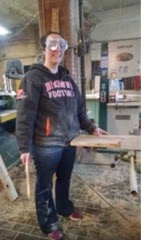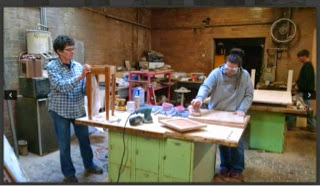I am so happy that my district was generous enough to send me this year, along with several of my colleagues to OETC. As usual, I had a fantastic time and learned a ton.
What's interesting to me, however, as I reflect on my time in Columbus last week, is the difference in my own learning style and learning needs since the last time I was there.
In the past, I came away with tools and tools and more new tools to use at school and with kids. Tools for efficiency, tools for creativity, tools for "drill and kill..."
This time, it was more about what to do with the tools AND what to do with education.
I learned more about the Google Apps for Educators, tips I didn't know after using it for over 2 years (or has it been longer?). I learned how to find more fonts in a Google Doc which will truly help some elementary teachers to finally make the switch from Word.
I also had time to play around with "add-ons." Typically in a school day, this doesn't take priority but it was nice to know some extended features like EasyBib and the highlighting tools. I realize this is easy and I could've figured it out in time, but I wasn't spending the time to do so. It was nice to have that time.
We heard a keynote speaker, a woman coder for Pixar. Danielle Feinberg (@dafeinberg) spoke about giving opportunities to everyone, regardless of gender. Of course this keynote felt like it was written for me because of my recent realization of and struggle with these gender inequalities.
I spent more time with my friends Sean Wheeler and Peter Debelak (@peterdebelak) discussing these same gender issues and feeling empowered because they often help me to realize that we can change these inequalities, one by one, slowly but surely. They are big time dreamers and doers. This is why I like them.
I spent time with folks from our district that I normally don't have time to chat with- Jacqui Berchtold (berchtoldj), Kim Taylor (@taylortchr), Scott Kinkoph (@scottkinkoph), and John Schinker (@schinker). We spent time talking about limitations and expectations in our own district while also having fun and gaining new rapport with each other.
Another keynote speaker, Yong Zhao (@yongzhaoUO) kept us laughing for over an hour. Nothing new but wonderfully fulfilling ideas about what's wrong with education and how we should change it. We ordered his book 5 minutes after he was done talking.
Spending time with so many like minded people was refreshing. So good to see Bob (@bob05), Ryan (@mr_collins), Toby (@tobyfischer), TJ (@tjhouston), Nevin (@mathremix), and Stacy (@stacyhaw) again!
On Wednesday, I spent a lot of times in the "unconference" aka OETCx. The day was filled with conversations, not presentations, about education. I engaged in one convo about "adult issues vs. student ones" where we discussed how adults should get out of the way already. Our own insecurities and fears are holding kids back.
I also stayed to talk about the Soulcraft Cohort with Sean and Pete. If you've been following this blog, you already know about it, but we all (along with Vicki Turner @Vturner8 and Jeremy Schorr @jeremyschorr) got to talk about our very authentic learning experiences thus far. By the way, we still go there every Saturday morning for our "six week class." I wish Tom Grodek (@mrgrodek), Jim McNaughton, Karen Wheeler (@mathcoachlkwd), Julie Rea (@juliesrea), and Christy Neider (@christyneider) could've been there too. Words don't do justice for what we've done with #soulco.
After that. A conversation about motivation and behavior... Since I am studying ABA currently, this was a major topic for me, and as I started the conversation, I realized its still a bit foggy for me, what I believe about intrinsic vs extrinsic rewards and motivation...
Then onto the FRED (Finding Real Education) talks where presenters had 15 slides at 30 sec per slide (or something like this) and shared short bursts of info with us. Jon Smith (@theipodteacher) inspired me to start using iBooks and Michael Rousch (@mdrousch) had me in tears as he spoke about his daughter with ASD. I cried, not because I pity him (I don't), or because his life is sad (it's not), or even because his story is particularly unique, but rather, because I felt proud. He was showing that we can do it. We can integrate that little bit of "oh hey, remember 'those kids' too when you develop tech and curriculum and school" into a day with folks who are generally apathetic to the topic of special education. He is a great model for me to say "look, it can be done." His preso is here-https://docs.google.com/presentation/d/1xg-WFENxgsFd1DLhRkmY4qc1nrkIlL2GLL0LQNmeefg/edit?usp=sharing&pref=2&pli=1
One thing that annoyed me was that there was not one female FRED Talker. I found out later that the document, which I never saw, was open for anyone yet "Why didn't any females sign up?" I believe I would've, yet after over a week pondering it, I'm still not sure what I would've talked about...
The tools I learned are important but the connections and conversations are priceless...
My friend Sean Wheeler (@mrwheeler or @teachinghumans on twitter) says "I became a teacher because I hated school."
For me, it's the opposite. I loved school and I played the game. I was great at the game of school. It's only now that I see that our kids today shouldn't be playing that game. They don't have the time. They are getting ready for jobs that haven't even been created yet. So why teach them with points and grades and worksheets and tests that make them cry?
More of these authentic experiences please!!!




